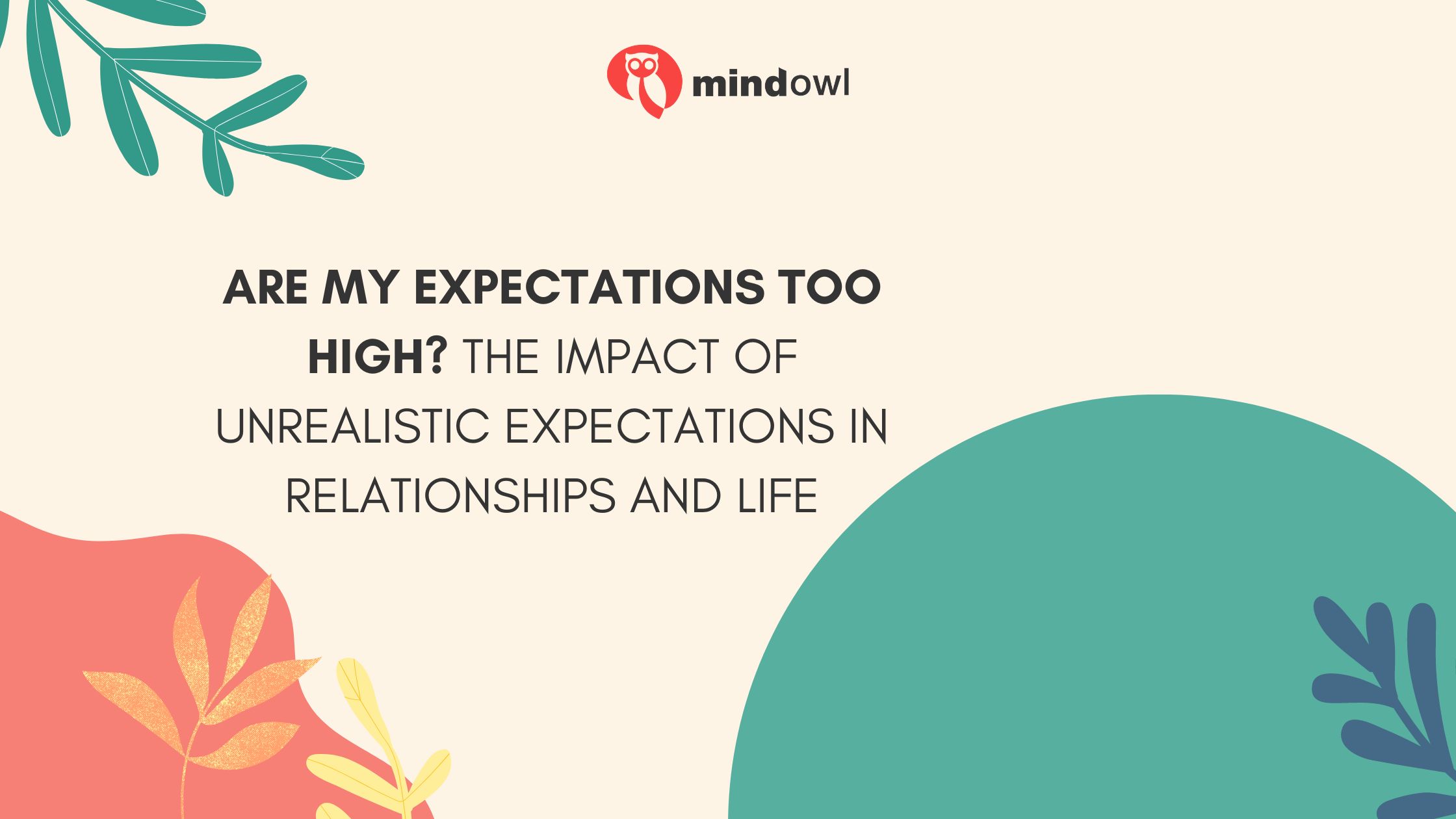Have you ever found yourself questioning whether your expectations in love and life might be soaring a tad too high? It’s a dilemma many grapple with, fostering discontentment and strain in relationships.
This blog ventures into the realm of expectations, offering insights on recognising when they become unrealistic and how adjusting them can transform your interactions and well-being.
Read on to navigate towards more fulfilling connections.
Key Takeaways
- Unrealistic expectations are like aiming for the stars with a paper airplane and can lead to disappointment and strain in relationships.
- High hopes that aren’t met hurt feelings, cause stress, and impact mental health negatively. Life is not always fair or perfect every day.
- Feedback from others helps us see if our expectations are too high. Talking openly solves many problems but is tough when we expect perfection.
- Accepting imperfections in ourselves and others builds stronger connections and happier lives. Setting realistic goals reduces stress.
- Good communication involves saying what you need clearly. It prevents misunderstandings in relationships caused by unrealistic expectations.
What are Unrealistic Expectations?

Unrealistic expectations are beliefs and standards that are not grounded in reality or are difficult to achieve. Examples include expecting your partner to fulfil all of your emotional needs, always understanding you without communication, or being perfect in every way.
These expectations can lead to dissatisfaction and conflict in relationships.
Definition
An unrealistic expectation is something a person hopes to achieve but may not be possible. It’s like aiming for the stars with a paper airplane; it looks fun, but it won’t get very far.
These expectations can lead to problems. They might make you expect too much from friends, partners or yourself. When these high hopes are not met, it can hurt feelings and relationships.
People often set unrealistic goals without knowing it. You might think everyone should always agree with you or that perfect happiness is normal every day. This isn’t how life works though.
Holding onto such beliefs can create trouble and leave you feeling let down.
Examples
Unrealistic expectations are beliefs we hold that aren’t likely to come true. They can set us up for disappointment.
- Believing life should always be fair is one example of setting yourself up for frustration. When things don’t go as planned, you might feel cheated.
- Thinking that your dream job will land in your lap without hard work often leads to missed opportunities and regret.
- Many people wish for a perfect partner who meets all their needs. This can cause strain in a relationship when that person isn’t found.
- Some expect constant happiness and no stress. This isn’t realistic because life has ups and downs, leading to mood swings when things aren’t great.
- A few try to control everything around them, including other people’s actions. This is impossible and creates tension between friends and family.
The Impact of Unrealistic Expectations in a Relationship

Unrealistic expectations in relationships can lead to problems such as communication breakdown, disappointment, and frustration. These expectations can create a sense of unmet needs and strain the relationship dynamic.
How they can cause problems
Expecting too much from your partner can make things hard. It might cause fights and stress because both of you may feel like you’re not doing enough. You might stop seeing the good in each other and only focus on what’s missing.
This can make both people feel bad about themselves.
Unrealistic expectations often mean you don’t talk well with each other. You might think your partner should know what you want without saying it. This leads to misunderstandings and feeling upset when needs are unmet.
Happy moments could turn sour if one person feels let down by what they thought would happen.
Communication breakdown
Expecting too much from our partners can cause a lot of trouble. People are not mind readers, yet we often think they should just know what we want. This can lead to fights because one person is upset for not having their needs met when they didn’t clearly say what those needs were.
Partners may start to feel angry or hurt, thinking the other doesn’t care enough to understand them.
Talking openly and honestly solves many problems in relationships. But with unrealistic expectations, good communication gets harder. Cognitive dissonance happens when actions and beliefs don’t match up, making talking things through tough.
We might get frustrated when our partner isn’t living up to some perfect idea we have in our head instead of appreciating who they really are.
The Impact of Unrealistic Expectations on Life
Unrealistic expectations can lead to disappointment, frustration, and a negative impact on mental health. Comparing ourselves to others and constantly striving for perfection can take a toll on our overall well-being.
Disappointment and frustration
High expectations can lead to big letdowns. You may hope for a perfect day, a dream job, or an ideal partner. But when these hopes aren’t met, it hurts. It’s like aiming for the stars and landing in mud.
This pain might make you feel sad or even mad.
Life with too high hopes can be tough on your mind. You compare yourself to others and end up feeling worse. Your head fills with “should” and “must,” which makes you anxious or stressed out.
To keep from being disappointed, it’s good to think about what is really possible.
Comparison with others
Frustration grows when we stack our lives against others’. Social media often shows only the best parts of people’s lives, making us feel like we’re falling behind. This can hurt how we see ourselves and mess with our mental health.
People look at friends or strangers online and think their own lives should be just as perfect. But this kind of thinking can trap you in a cycle of never feeling good enough.
You might watch couples who seem happy all the time and wonder why your relationship isn’t the same. It’s easy to forget that everyone has ups and downs, even if they don’t share them online.
Comparing yourself to these images can make you set goals for your partner and yourself that are too hard to reach. This stops real closeness from growing because you’re more focused on an ideal image than on building something true together.
Negative impact on mental health
Comparing ourselves with others often sets us up for disappointment, and this can hit our mental health hard. High expectations may cause stress and mood swings, making us feel like we never quite succeed.
The pressure to be perfect can mean we’re always chasing goals that are just too high. This relentless pursuit can leave us feeling anxious and stressed out.
Having expectations that are too high might make it seem like nothing is ever good enough. We try so hard to meet these impossible standards but end up feeling inadequate when we fall short.
Over time, the constant strain from trying to live up to such high ideals can lead to burnout. It’s tough on our minds when we keep failing at what seems like everything because of unrealistic goals set by ourselves or someone else.
How to Identify Unrealistic Expectations
Observe how others respond to your expectations and listen to their feedback. Pay attention to the difficulty in making meaningful connections or relationships and reflect on any perfectionistic tendencies you may have.
Feedback from others
Seeking feedback from others can offer valuable insights into our expectations. It allows us to gain a different perspective on our beliefs and behaviours, helping us recognise if our expectations are realistic or veering towards the unattainable.
Engaging in open conversations with friends, family, or even professionals can shed light on blind spots we might have regarding our own expectations and their impact on relationships and life.
Receiving feedback also provides an opportunity for self-reflection, allowing individuals to assess whether their expectations align with healthy standards. This process of external evaluation helps in identifying any potential tendencies towards setting unrealistic or overly demanding expectations that may be detrimental to personal well-being and relationships.
Difficulty in making meaningful connections
Recognising and articulating unrealistic expectations can be challenging, hindering the ability to form genuine connections. Constantly seeking perfection in others may create barriers to authentic relationships, impacting one’s emotional well-being and contentment.
Striving for unattainable ideals might lead to feelings of dissatisfaction and alienation, making it difficult to establish meaningful connections built on mutual understanding and acceptance.
Embracing imperfections within oneself and others is vital in fostering genuine and fulfilling relationships. Acknowledging the impact of unrealistic expectations is essential for personal growth and overall relationship satisfaction.
Perfectionism
Perfectionism often creates unattainable standards for oneself and others, leading to constant fault-finding and excessive criticism. It is driven by fear of failure, making individuals defensive when facing any form of critique.
Living with a perfectionist means meeting their intolerably high expectations or facing severe disapproval. This trait can impose damaging effects on both personal and professional relationships, as well as mental health.
Rising parental expectations have been linked to an increase in perfectionism among college students, highlighting the detrimental impact it can have on individuals’ well-being.

Managing Unrealistic Expectations
Accepting imperfections and communicating effectively are key strategies for managing unrealistic expectations in relationships and life. If you want to learn more about how to navigate this, keep reading!
Accepting imperfections
Accepting imperfections is crucial for fostering healthy relationships and personal growth. Unrealistic expectations of perfection can lead to dissatisfaction and strain in both romantic relationships and daily life.
Instead, embracing the imperfections and unique qualities in ourselves and others can cultivate compassion, understanding, and a more positive outlook on life. By acknowledging that no one is without flaws, we create space for genuine connection and empathy within our relationships.
In addition to relationship dynamics, accepting imperfections plays a vital role in preserving mental well-being. Studies have shown that striving for unattainable standards can result in increased stress levels and decreased overall happiness.
Communicating effectively
To manage unrealistic expectations, it’s essential to communicate effectively. Good communication can bridge the gap between partners’ needs and desires. Consistently expressing needs and openly discussing expectations can foster trust, respect, and affection within relationships.
Trustworthy communication is vital in addressing unrealistic expectations in both personal connections and daily life.
Open dialogue empowers individuals to voice their concerns and ensure that others understand their needs. By communicating effectively, people can establish realistic relationship expectations based on mutual understanding and empathy for one another’s feelings.
Setting realistic expectations
After learning how to communicate effectively in relationships, it’s crucial to shift towards setting realistic expectations
. It is natural to want the best for oneself and one’s relationships, but expecting perfection can lead to disappointment and frustration.Setting realistic expectations allows for a healthier approach, acknowledging that imperfections exist while striving for growth and improvement. Recognising this balance can promote emotional maturity and reduce unnecessary stress caused by unattainable standards.
Conclusion
In conclusion, unrealistic expectations can have a damaging impact on both relationships and life. Acknowledging and managing these expectations is crucial for fostering healthier connections and personal well-being.
By identifying and addressing unrealistic beliefs, individuals can strive for more realistic standards, leading to greater satisfaction and contentment in their relationships and daily lives.
Ultimately, embracing imperfections while communicating effectively can pave the way for more fulfilling experiences with oneself and others.
FAQs
How can I know if my expectations are too high in a relationship?
You can examine your expectations by considering whether they are reasonable, whether your partner has communicated that they feel overwhelmed, and whether they align with what is generally expected in a healthy relationship.
What are some signs that I might be expecting too much from my partner?
Signs might include feeling consistently disappointed, feeling needy, having a sense of entitlement, or feeling like your partner can never meet your needs.
When should I consider seeking couples therapy for unmet expectations?
If unmet expectations are causing persistent dissatisfaction in your relationship, it might be beneficial to seek couples therapy to address these issues and improve communication.
Should I expect my partner to read my mind and know what I need without me expressing it?
It’s more realistic and healthy to openly communicate your needs and desires with your partner, rather than expecting them to intuitively know what you need.
How can I manage my expectations about responsibilities around the house with my partner?
You and your partner can have an open and honest conversation to discuss and allocate responsibilities around the house that feel fair and reasonable for both of you.
What can I do if I feel like my partner never meets my specific expectations?
It might be beneficial to seek counsel from a licensed marriage and family therapist to help explore the source of your specific expectations and how to manage them within the relationship.
Is it common for people to expect a lot from their partners in a relationship?
Expectations are often a normal part of relationships, but individuals need to manage and communicate their expectations in healthy ways to avoid consistent dissatisfaction.
How can I navigate through setting expectations within a relationship to meet our needs?
It can be helpful to have open and honest communication with your partner to understand each other’s specific expectations and work towards finding a balance that meets the needs and satisfaction of both individuals.
When is it appropriate to seek counsel or couples therapy to manage my expectations in a relationship?
If you find that your expectations are significantly impacting your relationship overall, seeking counsel or couples therapy can be beneficial to explore and address these issues within a safe and supportive environment.
What are some healthy ways to expect my partner to want to be around me more often?
Building a strong sense of security, compatibility, and mutual satisfaction within the relationship can naturally lead to both partners wanting to spend more time together. Open communication and efforts to enhance the relationship can also support this.
MindOwl Founder – My own struggles in life have led me to this path of understanding the human condition. I graduated with a bachelor’s degree in philosophy before completing a master’s degree in psychology at Regent’s University London. I then completed a postgraduate diploma in philosophical counselling before being trained in ACT (Acceptance and commitment therapy).
I’ve spent the last eight years studying the encounter of meditative practices with modern psychology.


